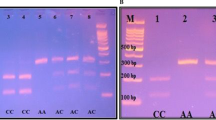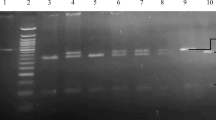Abstract
Purpose
Genetic susceptibility for tuberculosis in human has been previously demonstrated. Polymorphisms in genes involved in immune responses may alter the susceptibility of individuals to tuberculosis. Polymorphisms of beta-2 adrenergic receptor (ADRB2) gene can be possibly an important risk factor in tuberculosis. In this study, the association between rs1042713 (Arg16Gly +46A>G) and rs1042714 (Gln27Glu +79C>G) polymorphisms in ADRB2 gene and tuberculosis was evaluated.
Methods
Genotype distributions of the rs1042713 (Arg16Gly +46A>G) and rs1042714 (Gln27Glu +79C>G) polymorphisms in ADRB2 gene in 106 patients with pulmonary tuberculosis and 88 healthy subjects were studied by PCR–RFLP method in an Iranian population.
Results
The frequency of rs1042713*G and rs1042714*G alleles in ADRB2 gene in tuberculosis patients was significantly different from healthy controls [odds ratio (OR) 0.176, 95% confidence interval (CI) 0.065–0.48, P value <0.001 and OR 0.45, 95% CI 0.247–0.825, P value = 0.009, respectively]. There were no significant differences in haplotype analysis between the patients and control subjects.
Conclusion
The association was reported between rs1042713 and rs1042714 polymorphisms in ADRB2 gene and tuberculosis for the first time. rs1042713*G and rs1042714*G polymorphisms in ADRB2 gene makes people more susceptible to develop the disease.
Similar content being viewed by others
References
Lawn SD, Zumla AI (2011) Tuberculosis. Lancet 378(9785):57–72. doi:10.1016/S0140-6736(10)62173-3
Gupta S, Shenoy VP, Mukhopadhyay C et al (2011) Role of risk factors and socio-economic status in pulmonary tuberculosis: a search for the root cause in patients in a tertiary care hospital, South India. Trop Med Int Health 16(1):74–78. doi:10.1111/j.1365-3156.2010.02676.x
Rashedi J, Asgharzadeh M, Moaddab SR et al (2014) Vitamin D receptor gene polymorphism and vitamin D plasma concentration: correlation with susceptibility to tuberculosis. Adv Pharm Bull 4(Suppl 2):607–611. doi:10.5681/apb.2014.089
Azad AK, Sadee W, Schlesinger LS (2012) Innate immune gene polymorphisms in tuberculosis. Infect Immun 80(10):3343–3359. doi:10.1128/IAI.00443-12
Bhaladhare A, Sharma D, Kumar A et al (2016) Single nucleotide polymorphisms in toll-like receptor genes and case-control association studies with bovine tuberculosis. Vet World 9(5):458–464. doi:10.14202/vetworld.2016.458-464
Dittrich N, Berrocal-Almanza LC, Thada S et al (2015) Toll-like receptor 1 variations influence susceptibility and immune response to Mycobacterium tuberculosis. Tuberculosis 95(3):328–335. doi:10.1016/j.tube.2015.02.045
Milano M, Moraes MO, Rodenbusch R et al (2016) Single nucleotide polymorphisms in IL17A and IL6 are associated with decreased risk for pulmonary tuberculosis in Southern Brazilian population. PLoS ONE 11(2):e0147814. doi:10.1371/journal.pone.0147814
Lindenau JD, Guimaraes LS, Friedrich DC et al (2014) Cytokine gene polymorphisms are associated with susceptibility to tuberculosis in an Amerindian population. Int J Tuberc Lung Dis 18(8):952–957. doi:10.5588/ijtld.14.0060
Mosaad YM, Soliman OE, Tawhid ZE et al (2010) Interferon-gamma +874 T/A and interleukin-10 −1082 A/G single nucleotide polymorphism in Egyptian children with tuberculosis. Scand J Immunol 72(4):358–364. doi:10.1111/j.1365-3083.2010.02426.x
Zhu H, Zhang Z, Lei X et al (2012) Tumor necrosis factor alpha −308G>A, −863C>A, −857C>T gene polymorphisms and tuberculosis susceptibility: a meta-analysis. Gene 509(2):206–214. doi:10.1016/j.gene.2012.08.027
Arji N, Busson M, Iraqi G et al (2014) Genetic diversity of TLR2, TLR4, and VDR loci and pulmonary tuberculosis in Moroccan patients. J Infect Dev Ctries 8(4):430–440. doi:10.3855/jidc.3820
Harsini S, Ziaee V, Tahghighi F et al (2016) Association of interleukin-2 and interferon-gamma single nucleotide polymorphisms with Juvenile systemic lupus erythematosus. Allergol Immunopathol. doi:10.1016/j.aller.2015.12.005
Zayed AA, Khorshied MM, Hussein MF (2015) Inducible nitric oxide synthase promoter polymorphism: a molecular susceptibility marker for vitiligo in Egyptians. Int J Dermatol 54(6):675–679. doi:10.1111/ijd.12716
De Luca C, Gugliandolo A, Calabro C et al (2015) Role of polymorphisms of inducible nitric oxide synthase and endothelial nitric oxide synthase in idiopathic environmental intolerances. Mediat Inflamm 2015:245308. doi:10.1155/2015/245308
Oh JH, Yang CS, Noh YK et al (2007) Polymorphisms of interleukin-10 and tumour necrosis factor-alpha genes are associated with newly diagnosed and recurrent pulmonary tuberculosis. Respirology 12(4):594–598. doi:10.1111/j.1440-1843.2007.01108.x
Steagall WK, Barrow BJ, Glasgow CG et al (2007) Beta-2-adrenergic receptor polymorphisms in cystic fibrosis. Pharmacogenet Genomics 17(6):425–430. doi:10.1097/FPC.0b013e3280119349
Maestroni GJ (2006) Sympathetic nervous system influence on the innate immune response. Ann NY Acad Sci 1069:195–207. doi:10.1196/annals.1351.017
Johnson MW, Taylor BJ, Hulsebus ML et al (2012) Hypoxia induced changes in lung fluid balance in humans is associated with beta-2 adrenergic receptor density on lymphocytes. Respir Physiol Neurobiol 183(2):159–165. doi:10.1016/j.resp.2012.06.004
Lorton DBellinger DL (2015) Molecular mechanisms underlying beta-adrenergic receptor-mediated cross-talk between sympathetic neurons and immune cells. Int J Mol Sci 16(3):5635–5665. doi:10.3390/ijms16035635
Elenkov IJ, Wilder RL, Chrousos GP et al (2000) The sympathetic nerve—an integrative interface between two supersystems: the brain and the immune system. Pharmacol Rev 52(4):595–638
Kidd P (2003) Th1/Th2 balance: the hypothesis, its limitations, and implications for health and disease. Altern Med Rev 8(3):223–246
Caws M, Thwaites G, Dunstan S et al (2008) The influence of host and bacterial genotype on the development of disseminated disease with Mycobacterium tuberculosis. PLoS Pathog 4(3):e1000034. doi:10.1371/journal.ppat.1000034
Binaei S, Rashed SM, Christensen ML (2003) Beta2-adrenoreceptor polymorphisms in asthmatic patients. J Pediatr Pharmacol Ther 8(1):22–28. doi:10.5863/1551-6776-8.1.22
Al-Rubaish A (2011) Beta2-adrenergic receptor gene polymorphisms in normal and asthmatic individuals in the Eastern Province of Saudi Arabia. Ann Saudi Med 31(6):586–590. doi:10.4103/0256-4947.87094
Sitkauskiene B, Sakalauskas R (2005) The role of beta (2)-adrenergic receptors in inflammation and allergy. Curr Drug Targets Inflamm Allergy 4(2):157–162
Ranade K, Shue WH, Hung YJ et al (2001) The glycine allele of a glycine/arginine polymorphism in the beta2-adrenergic receptor gene is associated with essential hypertension in a population of Chinese origin. Am J Hypertens 14(12):1196–1200
Xie H, Cheng Y, Huo Y et al (2014) Association between beta2-adrenoceptor gene polymorphisms and asthma risk: an updated meta-analysis. PLoS ONE 9(7):e101861. doi:10.1371/journal.pone.0101861
Abu-Amero KK, Al-Boudari OM, Mohamed GH et al (2006) The Glu27 genotypes of the beta2-adrenergic receptor are predictors for severe coronary artery disease. BMC Med Genet 7:31. doi:10.1186/1471-2350-7-31
Adriani KS, Brouwer MC, Baas F et al (2012) Genetic variation in the beta2-adrenocepter gene is associated with susceptibility to bacterial meningitis in adults. PLoS ONE 7(5):e37618. doi:10.1371/journal.pone.0037618
Marson FA, Bertuzzo CS, Ribeiro AF et al (2012) Polymorphisms in ADRB2 gene can modulate the response to bronchodilators and the severity of cystic fibrosis. BMC Pulm Med 12:50. doi:10.1186/1471-2466-12-50
Qiu Y, Zhang D, Qin Y et al (2014) Effect of beta2 -adrenergic receptor gene Arg16Gly polymorphisms on response to long-acting beta2-agonist in Chinese Han asthmatic patients. Multidiscip Respir Med 9(1):22. doi:10.1186/2049-6958-9-22
Contopoulos-Ioannidis DG, Manoli EN, Ioannidis JP (2005) Meta-analysis of the association of beta2-adrenergic receptor polymorphisms with asthma phenotypes. J Allergy Clin Immunol 115(5):963–972. doi:10.1016/j.jaci.2004.12.1119
Hall IP, Blakey JD, Al Balushi KA et al (2006) Beta2-adrenoceptor polymorphisms and asthma from childhood to middle age in the British 1958 birth cohort: a genetic association study. Lancet 368(9537):771–779. doi:10.1016/S0140-6736(06)69287-8
Soleimani F, Fahimi F, Adimi Naghan P et al (2013) The effect of polymorphisms of beta2 adrenoceptors on response to long-acting beta2 agonists in Iranian asthmatic patients. Iran J Allergy Asthma Immunol 12(4):383–390
Larocca N, Moreno D, Garmendia JV et al (2013) Beta 2 adrenergic receptor polymorphisms, at codons 16 and 27, and bronchodilator responses in adult Venezuelan asthmatic patients. Biomed Pap Med Fac Univ Palacky Olomouc Czech Repub 157(4):374–378. doi:10.5507/bp.2012.084
Summerhill E, Leavitt SA, Gidley H et al (2000) Beta (2)-adrenergic receptor Arg16/Arg16 genotype is associated with reduced lung function, but not with asthma, in the Hutterites. Am J Respir Crit Care Med 162(2 Pt 1):599–602. doi:10.1164/ajrccm.162.2.9910108
Sahi PK, Shastri S, Lodha R et al (2016) ADRB2 polymorphism and salbutamol responsiveness in Northern Indian children with mild to moderate exacerbation of asthma. Indian Pediatr 53(3):211–215
Szczepankiewicz A, Bręborowicz A, Sobkowiak P et al (2009) Role of ADRB2 gene polymorphism in asthma and response to β2-agonists in Polish children. J Appl Genet 50(3):275–281
Elenkov IJ, Chrousos GP (1999) Stress hormones, Th1/Th2 patterns, pro/anti-inflammatory cytokines and susceptibility to disease. Trends Endocrinol Metab 10(9):359–368
Fan X, Wang Y (2009) β2 adrenergic receptor on T lymphocytes and its clinical implications. Prog Nat Sci 19(1):17–23
Israel E, Drazen JM, Liggett SB et al (2001) Effect of polymorphism of the beta (2)-adrenergic receptor on response to regular use of albuterol in asthma. Int Arch Allergy Immunol 124(1–3):183–186. doi:10.1164/ajrccm.162.1.9907092
Karam RA, Sabbah NA, Zidan HE et al (2013) Association between genetic polymorphisms of beta2 adrenergic receptors and nocturnal asthma in Egyptian children. J Investig Allergol Clin Immunol 23(4):262–266
Birbian N, Singh J, Jindal SK et al (2012) Association of beta (2)-adrenergic receptor polymorphisms with asthma in a North Indian population. Lung 190(5):497–504. doi:10.1007/s00408-012-9407-7
Wechsler ME, Lehman E, Lazarus SC et al (2006) Beta-adrenergic receptor polymorphisms and response to salmeterol. Am J Respir Crit Care Med 173(5):519–526. doi:10.1164/rccm.200509-1519OC
Jazdzewski K, Bednarczuk T, Stepnowska M et al (2007) Beta-2-adrenergic receptor gene polymorphism confers susceptibility to Graves disease. Int J Mol Med 19(1):181–186
Chu X, Dong Y, Shen M et al (2009) Polymorphisms in the ADRB2 gene and Graves disease: a case-control study and a meta-analysis of available evidence. BMC Med Genet 10(1):1
Heijnen CJ (2007) Receptor regulation in neuroendocrine-immune communication: current knowledge and future perspectives. Brain Behav Immun 21(1):1–8. doi:10.1016/j.bbi.2006.08.008
Acknowledgements
This work was supported by the Deputy of Research and Technology of Urmia University of Medical Sciences, Urmia, Iran (Grant No. 1393-04-32-1322). The authors would like to thank Infectious & Tropical Disease Research Center and Tuberculosis and Lung Diseases Research Center in Tabriz University of Medical Sciences. The authors also thank all the tuberculosis patients and their families who helped us to complete the required data.
Author information
Authors and Affiliations
Corresponding author
Ethics declarations
Conflict of interest
The authors declare no conflict of interest.
Ethical approval
The study was approved by the Ethics Committee of Urmia University of Medical Sciences, Urmia, Iran, and all subjects signed informed consents. “All the procedures performed in this study involving human participants were in accordance with ethical standards of the ethics committee of Urmia University of Medical Sciences and with the 1964 Helsinki declaration and it’s later amendments or comparable ethical standards.”
Informed consent
Informed consent was obtained from all individual participants included in this study.
Rights and permissions
About this article
Cite this article
Azar, A.F., Jazani, N.H., Bazmani, A. et al. Polymorphisms in Beta-2 Adrenergic Receptor Gene and Association with Tuberculosis. Lung 195, 147–153 (2017). https://doi.org/10.1007/s00408-016-9968-y
Received:
Accepted:
Published:
Issue Date:
DOI: https://doi.org/10.1007/s00408-016-9968-y




